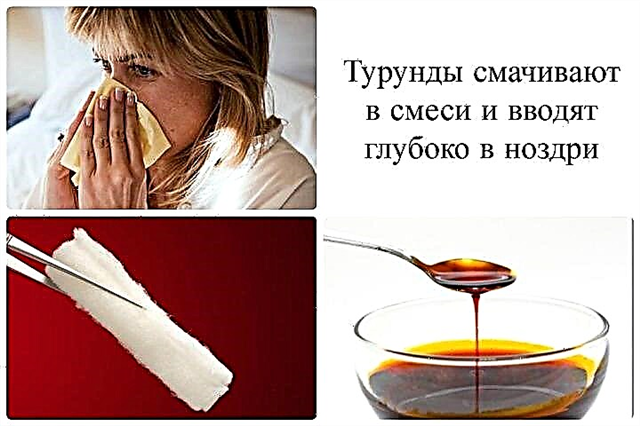It is believed that ginger is an oriental plant. But in fact, it grows with us. It's just that in the east, ginger has been used as an effective medicine for a very long time. But these recipes are gradually moving into our latitudes, especially since ginger is now quite available. You can buy it at any supermarket. Most often we use ginger for colds and coughs, although it can cure other diseases as well.
Properties of ginger
 Ginger root, when used correctly, in terms of the effectiveness of the therapeutic effect, can even be compared with the famous "golden root" - ginseng. Ginger has a complex healing effect on the body:
Ginger root, when used correctly, in terms of the effectiveness of the therapeutic effect, can even be compared with the famous "golden root" - ginseng. Ginger has a complex healing effect on the body:
- bactericidal;
- expectorant;
- anti-inflammatory;
- antiseptic;
- antispasmodic;
- pain reliever;
- hypotonic;
- calming.
In addition, it significantly improves digestion, stimulates the immune system, stimulates appetite and gives a boost of vitality.
All this is possible thanks to the unique composition of ginger. It is rich in minerals and trace elements, most of which are vital (potassium, magnesium, iron, zinc, iodine, manganese, copper, chromium, selenium). Contains ginger and organic acids, essential oils and bioflavonoids. Such a wealth of substances valuable for the body makes ginger not only a remedy that can quickly stop a cough, but a real medicine that directly affects the cause of its appearance.
How to choose and store
 You can find out whether ginger helps with coughs by checking it out on your own experience. Ginger is a versatile remedy that can quickly relieve both wet and dry coughs. But since it has pronounced expectorant properties, it heals a wet cough much more effectively, contributing to the active excretion of phlegm.
You can find out whether ginger helps with coughs by checking it out on your own experience. Ginger is a versatile remedy that can quickly relieve both wet and dry coughs. But since it has pronounced expectorant properties, it heals a wet cough much more effectively, contributing to the active excretion of phlegm.
For medicinal purposes, fresh ginger root is most useful and valuable. You can buy it at the market or supermarket. You need to choose it correctly. The root should be firm and smooth with intact skin. If it is wrinkled, it means that some of the moisture has already been lost, and the root itself has been stored for a long time or at too high a temperature. It is imperative to inspect the root from all sides so that there are no traces of mold and decay - they can appear if it was stored in high humidity.
You do not need to store the root at home in the refrigerator - it is too cold and humid there. Ideal conditions are in a dark, dry place at room temperature.
The outer dense skin perfectly protects the root from drying out. Therefore, before preparing the medicine with ginger, you need to cut off a piece of the desired size from the root and peel only it, putting the rest of it in the storage area.
The best recipes
 Below are the best folk recipes that use ginger root for cough suppressants. They are very easy to make at home in just a few minutes:
Below are the best folk recipes that use ginger root for cough suppressants. They are very easy to make at home in just a few minutes:
- Ginger tea. The simplest and most effective recipe, which perfectly helps even with a strong unproductive cough. It very quickly relieves a sore throat, removes phlegm, promotes the elimination of toxins and significantly speeds up recovery. For preparation, it is better to use green leaf tea, which should not be brewed with boiling water, but with water with a temperature not higher than 70-80 0C. In a large cup or thermos, put a teaspoon of tea leaves, 1.5-2 cm of finely chopped ginger root, cover with water and cover. Insist for about 10 minutes and drink in small sips. You can add a teaspoon of honey to warm (not hot!) Tea.
- Ginger milk. It is milder than ginger tea. Well suited for those who often cough at night. It does not have such a powerful stimulating effect on the body as ginger tea, so you can drink it at night and give ginger milk to children (after 6 years). Grate 1.5-2 cm of the peeled root and pour in a glass of milk. Put on low heat, bring to a boil, boil for 5 minutes. Strain through a sieve or several layers of gauze, add a teaspoon of honey and half a teaspoon of ghee. Drink in small sips while lying in bed. Ginger milk can cause increased sweating, so it is best to prepare a change of clothing in advance.
 Gingerbread lollipops. An excellent remedy for dry and harsh coughs is ordinary burnt sugar, from which it is very easy to make lollipops even at home. But ginger cough drops are much tastier and more effective. To make them, you must first squeeze out the ginger juice. To do this, cut off a few centimeters of the ginger root and grate it on a fine grater. Then squeeze the juice through several layers of cheesecloth. You can add the same amount of freshly squeezed lemon juice, which also has antibacterial properties and strengthens the immune system. A glass of regular sugar must be melted over low heat and brought to a golden, uniform mass. Pour ginger juice into it, mix well and immediately remove from heat and pour into molds. Children love cough lollipops. But they are no less good at helping adults. With severe attacks, hard cough drops are dangerous to use - they can enter the upper respiratory tract. You can dissolve the lollipop in a glass of warm water or milk and drink it as a potion.
Gingerbread lollipops. An excellent remedy for dry and harsh coughs is ordinary burnt sugar, from which it is very easy to make lollipops even at home. But ginger cough drops are much tastier and more effective. To make them, you must first squeeze out the ginger juice. To do this, cut off a few centimeters of the ginger root and grate it on a fine grater. Then squeeze the juice through several layers of cheesecloth. You can add the same amount of freshly squeezed lemon juice, which also has antibacterial properties and strengthens the immune system. A glass of regular sugar must be melted over low heat and brought to a golden, uniform mass. Pour ginger juice into it, mix well and immediately remove from heat and pour into molds. Children love cough lollipops. But they are no less good at helping adults. With severe attacks, hard cough drops are dangerous to use - they can enter the upper respiratory tract. You can dissolve the lollipop in a glass of warm water or milk and drink it as a potion.- Ginger compress. It can perfectly replace traditional mustard plasters. It warms up deeply, relieves spasms and helps even with advanced bronchitis. Peel a small whole ginger root and grate it finely. Heat the resulting gruel in a water bath. Take gauze or thick cotton cloth folded in several layers and put the compress on the chest. Cover the top with cellophane wrap and a terry towel. Hold for 15-20 minutes. If there is a strong burning sensation, remove it earlier. To relieve irritation, you need to apply a soothing cream to your skin. Apply every other day. Children can also do such a compress, but before that, you need to lubricate the delicate skin with baby cream to protect it from burns, and keep the compress less.
 Ginger inhalation. Great for any cough. It is especially effective for ARVI, flu, tonsillitis, and other inflammatory diseases of the upper respiratory tract. You don't need to have an inhaler in your home for this. You can just breathe over a saucepan of hot water, covering your head with a towel. To prepare ginger water for inhalation, grate the peeled ginger root and pour in a liter of boiling water. The combination of ginger with chamomile, sage, calendula, thyme works well. Plants enhance each other's healing properties. Therefore, you can add another tablespoon of the selected dry herbs to the water. Instead of the herb, you can add a few drops of the essential oil of the same plants. Duration of inhalation is 5-10 minutes. After it, you cannot go outside for at least 30 minutes, and in the cold season - at least an hour.
Ginger inhalation. Great for any cough. It is especially effective for ARVI, flu, tonsillitis, and other inflammatory diseases of the upper respiratory tract. You don't need to have an inhaler in your home for this. You can just breathe over a saucepan of hot water, covering your head with a towel. To prepare ginger water for inhalation, grate the peeled ginger root and pour in a liter of boiling water. The combination of ginger with chamomile, sage, calendula, thyme works well. Plants enhance each other's healing properties. Therefore, you can add another tablespoon of the selected dry herbs to the water. Instead of the herb, you can add a few drops of the essential oil of the same plants. Duration of inhalation is 5-10 minutes. After it, you cannot go outside for at least 30 minutes, and in the cold season - at least an hour.
These are just a few basic ways to use ginger for a cough; there are many other recipes on the Internet. But, in fact, all of them are just variants of the above.
Be careful - in rare cases, ginger causes a strong allergic reaction. Therefore, it is better to do a test before using it for the first time. To do this, cut off a small piece of the root and smear the skin on the back of the wrist with juice. If redness, rashes and other undesirable manifestations do not occur within an hour, the root can be used for treatment.
Features and contraindications
 Since ginger contains many biologically active compounds, there are contraindications to its use. Ginger cough treatment is strongly discouraged for those with the following health problems:
Since ginger contains many biologically active compounds, there are contraindications to its use. Ginger cough treatment is strongly discouraged for those with the following health problems:
- high blood pressure;
- recent heart attack and stroke;
- serious cardiovascular disease;
- increased body temperature;
- tendency to strong allergic reactions.
Since ginger strongly activates blood circulation, it should be used with extreme caution during pregnancy - in the third trimester and with the threat of miscarriage, it is categorically contraindicated.
Essential oils can also enter breast milk, causing increased activity and insomnia in the child, therefore, it is better to refuse this remedy during breastfeeding.

 Gingerbread lollipops. An excellent remedy for dry and harsh coughs is ordinary burnt sugar, from which it is very easy to make lollipops even at home. But ginger cough drops are much tastier and more effective. To make them, you must first squeeze out the ginger juice. To do this, cut off a few centimeters of the ginger root and grate it on a fine grater. Then squeeze the juice through several layers of cheesecloth. You can add the same amount of freshly squeezed lemon juice, which also has antibacterial properties and strengthens the immune system. A glass of regular sugar must be melted over low heat and brought to a golden, uniform mass. Pour ginger juice into it, mix well and immediately remove from heat and pour into molds. Children love cough lollipops. But they are no less good at helping adults. With severe attacks, hard cough drops are dangerous to use - they can enter the upper respiratory tract. You can dissolve the lollipop in a glass of warm water or milk and drink it as a potion.
Gingerbread lollipops. An excellent remedy for dry and harsh coughs is ordinary burnt sugar, from which it is very easy to make lollipops even at home. But ginger cough drops are much tastier and more effective. To make them, you must first squeeze out the ginger juice. To do this, cut off a few centimeters of the ginger root and grate it on a fine grater. Then squeeze the juice through several layers of cheesecloth. You can add the same amount of freshly squeezed lemon juice, which also has antibacterial properties and strengthens the immune system. A glass of regular sugar must be melted over low heat and brought to a golden, uniform mass. Pour ginger juice into it, mix well and immediately remove from heat and pour into molds. Children love cough lollipops. But they are no less good at helping adults. With severe attacks, hard cough drops are dangerous to use - they can enter the upper respiratory tract. You can dissolve the lollipop in a glass of warm water or milk and drink it as a potion. Ginger inhalation. Great for any cough. It is especially effective for ARVI, flu, tonsillitis, and other inflammatory diseases of the upper respiratory tract. You don't need to have an inhaler in your home for this. You can just breathe over a saucepan of hot water, covering your head with a towel. To prepare ginger water for inhalation, grate the peeled ginger root and pour in a liter of boiling water. The combination of ginger with chamomile, sage, calendula, thyme works well. Plants enhance each other's healing properties. Therefore, you can add another tablespoon of the selected dry herbs to the water. Instead of the herb, you can add a few drops of the essential oil of the same plants. Duration of inhalation is 5-10 minutes. After it, you cannot go outside for at least 30 minutes, and in the cold season - at least an hour.
Ginger inhalation. Great for any cough. It is especially effective for ARVI, flu, tonsillitis, and other inflammatory diseases of the upper respiratory tract. You don't need to have an inhaler in your home for this. You can just breathe over a saucepan of hot water, covering your head with a towel. To prepare ginger water for inhalation, grate the peeled ginger root and pour in a liter of boiling water. The combination of ginger with chamomile, sage, calendula, thyme works well. Plants enhance each other's healing properties. Therefore, you can add another tablespoon of the selected dry herbs to the water. Instead of the herb, you can add a few drops of the essential oil of the same plants. Duration of inhalation is 5-10 minutes. After it, you cannot go outside for at least 30 minutes, and in the cold season - at least an hour.

